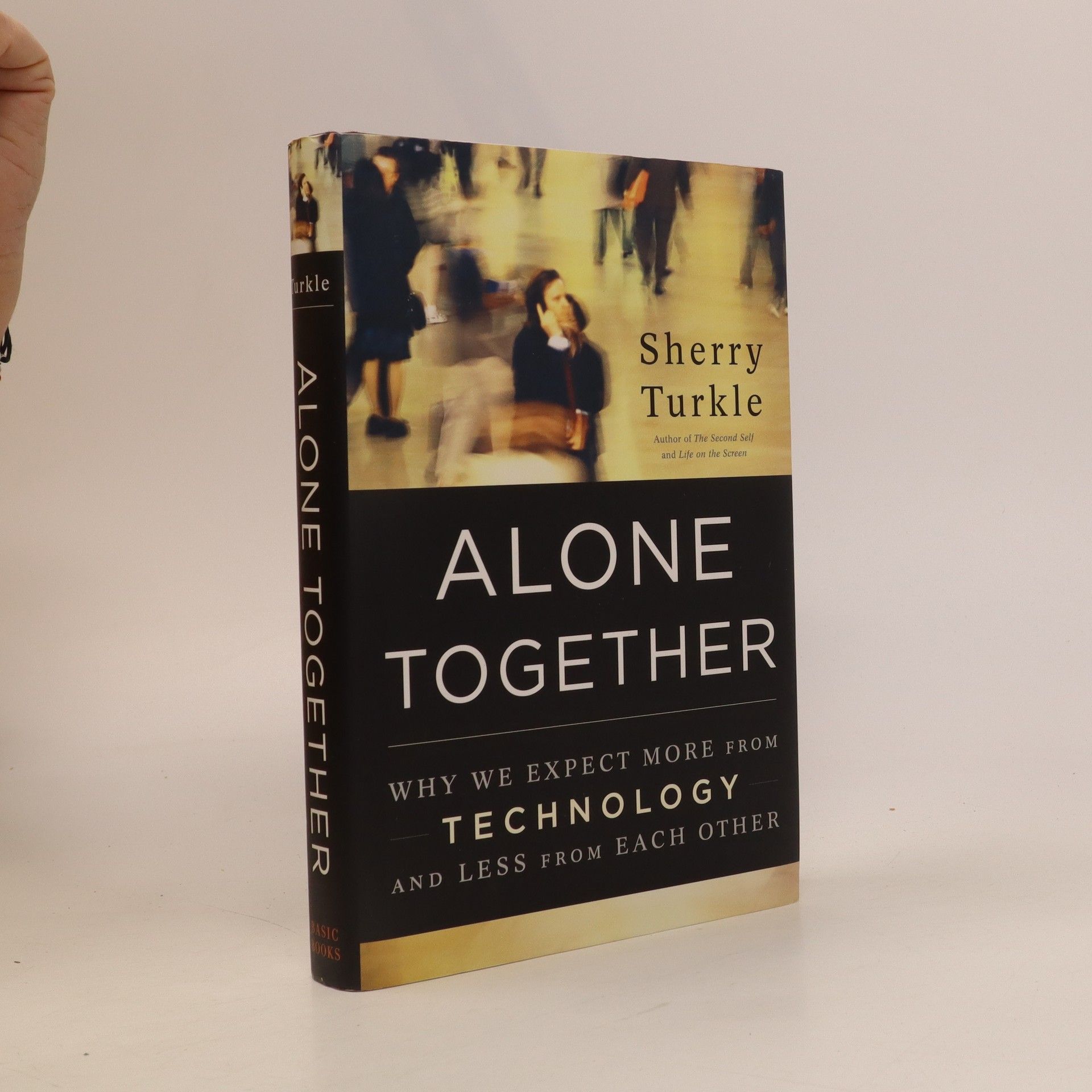Sherry Turkle Book order (chronological)
Sherry Turkle explores the subjective dimension of people's relationships with technology, particularly computers. As an expert in mobile technology, social networking, and robotics, she investigates how technology shapes us and how we, in turn, shape it. Her work delves into the deeper psychological and social impacts of technology on our lives. Turkle offers insightful perspectives on how technological advancements influence our connections and our sense of self in the digital age.






"MIT psychologist and bestselling author of Reclaiming Conversation and Alone Together , Sherry Turkle's intimate memoir of love and work In this vivid and poignant narrative, Sherry Turkle ties together her coming-of-age story and her groundbreaking research on technology, empathy, and ethics. Growing up in post-war Brooklyn in a house filled with mysteries, Turkle searched for clues. She mastered the codes that governed her secretive mother's world. She learned never to ask about her absent scientist father. And never to use his name, her name. Empathy was her strategy for survival. Turkle's intellect and curiosity propelled her to the thresholds of defining cultural moments that became life-lessons: she practiced friendship at Harvard/Radcliffe at the cusp of co-education during the antiwar movement, mourned the loss of her mother in Paris as students returned from the 1968 barricades, and faced the extent of her ambition while fighting for her place in the academy as a woman at MIT. There, Turkle found turbulent love and chronicled the wonders of the new computer culture, even as she warned of its threat to our most essential human connections. The Empathy Diaries captures all this in rich detail--and offers a masterclass in finding meaning through life's work."-- Provided by publisher
The Empathy Diaries: A Memoir
- 384 pages
- 14 hours of reading
"MIT psychologist and bestselling author of Reclaiming Conversation and Alone Together , Sherry Turkle's intimate memoir of love and work In this vivid and poignant narrative, Sherry Turkle ties together her coming-of-age story and her groundbreaking research on technology, empathy, and ethics. Growing up in post-war Brooklyn in a house filled with mysteries, Turkle searched for clues. She mastered the codes that governed her secretive mother's world. She learned never to ask about her absent scientist father. And never to use his name, her name. Empathy was her strategy for survival. Turkle's intellect and curiosity propelled her to the thresholds of defining cultural moments that became life-lessons: she practiced friendship at Harvard/Radcliffe at the cusp of co-education during the antiwar movement, mourned the loss of her mother in Paris as students returned from the 1968 barricades, and faced the extent of her ambition while fighting for her place in the academy as a woman at MIT. There, Turkle found turbulent love and chronicled the wonders of the new computer culture, even as she warned of its threat to our most essential human connections. The Empathy Diaries captures all this in rich detail--and offers a masterclass in finding meaning through life's work."-- Provided by publisher
En defensa de la conversación
- 496 pages
- 18 hours of reading
¿Hemos sacrificado la conversación por la conexión? Estamos sumidos en la cultura digital y en un estado de constante conexión. Hemos desarrollado afición por las interacciones sociales virtuales dentro de los ámbitos del trabajo, la familia, la amistad, la educación y las relaciones sentimentales, sin advertir el peligro que ello comporta. Casi sin darnos cuenta, hemos abandonado la conversación cara a cara. Sherry Turkle, la principal especialista en la interacción entre las nuevas tecnologías y el ser humano, analiza en este libro las desastrosas consecuencias de la pérdida de la conversación que hemos experimentado en los últimos años, que hace peligrar lo que nos define como seres humanos. En defensa de la conversación es una cautivadora apología del valor fundamental de las conversaciones cara a cara en todos los ámbitos de nuestra vida y una llamada a recuperar el terreno perdido.
La conversazione necessaria
La forza del dialogo nell'era digitale
Viviamo in un mondo che sempre piú sacrifica i piaceri e i benefici della conversazione sull'altare delle tecnologie digitali. Parliamo con un amico, ma nel frattempo diamo piú di un'occhiata allo smartphone, e spesso i nostri figli si lagnano se non hanno tra le mani un dispositivo elettronico. Viviamo costantemente in un altrove digitale. Ma per capire chi siamo, per comprendere appieno il mondo che ci circonda, per crescere, per amare ed essere amati, dobbiamo saper conversare. La perdita della capacità di parlare < > con gli altri - con empatia, imparando nel contempo a sopportare solitudine e inquietudini - rischia di ridurre le nostre capacità di riflessione e concentrazione, portandoci, nei casi estremi, a stati di dissociazione psichica e cognitiva. In questo libro, frutto di anni di interviste e di indagini sul campo, Sherry Turkle, < >, sottolinea le insidie e gli effetti delle appendici tecnologiche che ci circondano nella società e nella nostra vita quotidiana, per far sí che ognuno ridiventi padrone di se stesso, senza farsene acriticamente dominare
Reclaiming conversation. The power of talk in a digital age
- 448 pages
- 16 hours of reading
Argues that today's digital culture is undermining relationships, creativity, and productivity, and pushes for the return of face-to-face interaction among people
Reclaiming Conversation
- 436 pages
- 16 hours of reading
Preeminent author and researcher Sherry Turkle has studied digital culture for over thirty years. While she has long been an enthusiast for its possibilities, she now investigates a troubling consequence: our tendency to avoid conversation in various aspects of life—work, home, politics, and love—opting instead for texts and emails that allow us to disengage. This shift has led to silent dinner tables where children compete with phones for parental attention and friends struggle to maintain conversations when few are looking up from their screens. At work, we retreat to our devices, despite the fact that informal conversations enhance productivity and commitment. Online, we often share only agreeable opinions, avoiding the real conflicts of public discourse. The need for conversation begins with self-reflection, which is endangered in an always-connected world where loneliness is seen as a problem technology should solve. This reliance on others for self-worth diminishes our empathy and relationships. The consequences of avoiding conversation are evident: it undermines democracy and business success, while fostering empathy, friendship, love, and learning in our personal lives. However, there is hope; Turkle's five years of research reveal that we can reclaim conversation, the most humanizing act we engage in, to address modern challenges. We possess everything we need to start—each other.
Alone Together
- 360 pages
- 13 hours of reading
Argues that social-networking sites, companion robots and other technology are fueling disturbing levels of isolation and are causing humans to mistake digital communication for actual human connection. By the author of Simulations and Its Discontents.
Google, Facebook, E-mail und Online-Games haben unser Leben fest im Griff. Wie wird unsere Zukunft aussehen? Wir wollten sie als smarte „Diener“ unseres Alltags, nun sind sie unsere Herren. Sie sollten uns helfen, Zeit zu sparen, nun sind sie zu Zeitfressern sondergleichen geworden. Wir wollten sie programmieren, jetzt programmieren sie uns. Wenn insbesondere junge Leute hemmungslos in Blogs, Chats, Kontaktforen und Onlinewelten abtauchen, hat das einen tieferen Psychologischen Grund: Menschliche Beziehungen erscheinen zunehmend kompliziert und verletzend. Dafür bietet das Netz Kontakt ohne wahre Intimität, Gemeinschaft ohne Risiko, Nähe mit ausreichendem Sicherheitsabstand. Der moderne Mensch hat oft 100 Facebook-Friends, aber keinen einzigen echten Freund. Computer und Internet geben uns die Freiheit, überall zu arbeiten – in Wahrheit sind wir überall „gemeinsam einsam“. Sherry Turkle zeigt, wie Technologien zunehmend die Funktionsweise unseres Geistes und unser Gefühlsleben beeinflussen. Sie führt uns mit aktuellen Studien und drastischen Fallbeispielen vor Augen, welche ernsten Konsequenzen die gedankenlose Hingabe an die digitalen Verführer hat. Aber sie verdammt die Cyberwelt keineswegs als Teufelszeug. Denn wir haben durchaus die Chance, ihre immer grenzenloseren Möglichkeiten verantwortungsvoll zu nutzen.
Alone together : why we expect more from technology and less from each other
- 384 pages
- 14 hours of reading
Technology has become the architect of our intimacies. Online, we fall prey to the illusion of companionship, gathering thousands of Twitter and Facebook friends, and confusing tweets and wall posts with authentic communication. But this relentless connection leads to a new solitude.


